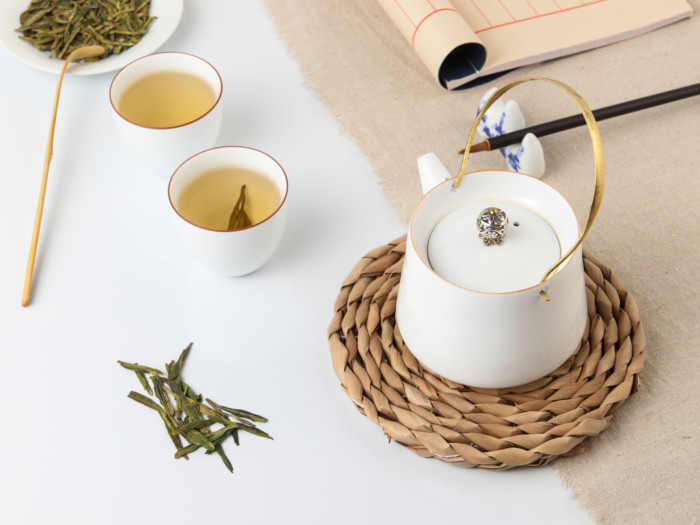Drinking Longjing tea has been in practice for thousands of years, but it has only recently begun to spread to other parts of the world.
What is Longjing Tea?
Longjing tea is a variety of green tea that is commonly called ‘Dragon Well tea’ and is prepared by hand by heating in large pans or woks. This type of green tea is roasted soon after being picked, which stops the oxidation process, similar to most other green tea varieties. By stopping the oxidation process, this type of tea is able to retain a very high concentration of antioxidants, catechins, and other polyphenolic compounds. This highly sought-after tea has a surprisingly high level of caffeine, almost the same as a cup of coffee, but there are other active ingredients that can simultaneously soothe the body. This specialty tea has a mildly astringent taste, similar to other green teas, but it is light yellow in color, rather than the yellow-green color of most other similar teas. [1]
Longjing Tea Varieties
There are various types of this tea, including Shi Feng Longjing tea, Mei Jia Wu Longjing tea, and xi hu Longjing tea, among others.
- Shi Feng – These leaves are yellowish-green and the tea has a very strong aroma and flavor.
- Mei Jia Wu – The unusual jade-green color of this tea makes it very recognizable.
- Xi Hu – This tea is known for its concentrated potency, and ability to be used repeatedly in different infusions.
Longjing Tea Benefits
The top benefits of this tea include its effect on the following:
- Weight management
- Anticancer Potential
- Relief from symptoms of stress and anxiety
- Lower risk of heart ailments

Longjing tea is one of the most famous teas in China. Photo Credit: Shutterstock
Weight Loss
Stimulating the metabolism and increasing energy levels, this tea can aid in passive fat burning and weight loss. [2]
Stress and Anxiety
The theanine found in this specialty tea is a known sedative substance, helping to counter the stimulant effects of the caffeine in the tea. [3]
How to Make Longjing Tea?
Making your own Longjing tea at home is simple, provided you have access to the leaves. Take a look at the recipe given below.

Longjing Tea (Dragon Well Tea) Recipe
Ingredients
- 3 grams of Longjing Tea
- 3 cups of water
- 1 tsp honey (optional)
Instructions
- To make Longjing Tea (Dragon Well Tea), add 3 grams of dried Longjing tea into a teapot or infuser.
- Heat a saucepan of water to boil. Once it is boiled, take it down from the stove and allow the water to cool for 3-4 minutes.
- Pour the warm water into the cup slowly, allowing the leaves to float on top. Let the tea steep for 2-3 minutes, then strain out the leaves and enjoy! Before serving, you can add a tsp of your preferred sweetener to the tea. We would recommend you to use honey as it is a healthier option.
Longjing Tea Side Effects
There are very few side effects to this tea, but as with any beverage containing caffeine, there can be side effects related to gastrointestinal problems, such as diarrhea, constipation, and stomach upset. Furthermore, drinking an excessive amount of this tea can cause nervous system problems and sleeplessness.
